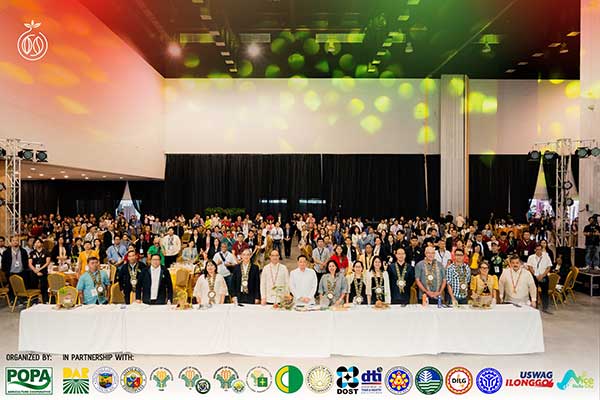
By Mariela Angella Oladive
The 2nd National Coffee, Cacao, and Coconut (CoCaNut) Congress 2024 opened on November 6 at the Iloilo Convention Center, with a central focus on the effects of climate change on the coffee, cacao, and coconut industries.
Themed “Resilient and Sustainable Agriculture in Changing Climates,” the three-day event aimed to address climate resilience across these sectors, organized by the Panay Organic Producers Association (POPA) Agriculture Cooperative in partnership with the Iloilo City and provincial governments, the Regional Agricultural and Fishery Council (RAFC) VI, and other regional agencies.
Dr. Dexter Respicio Buted, administrator of the Philippine Coconut Authority, emphasized the congress’s significance in tackling challenges posed by climate change.
“Our objective is to understand the current status, opportunities, and challenges facing coffee, cacao, and coconut production to bolster climate resilience,” Buted said.
He noted that agriculture’s vulnerability to climate shocks impacts crop yields, supply chains, and farmers’ livelihoods, making it essential to address these issues for sustainable production and export growth.
He added that the congress aims to unite stakeholders to strengthen these industries with the support of partner agencies.
Undersecretary for High-Value Crops at the Department of Agriculture Cheryl Marie Natividad-Caballero, representing Secretary Francisco “Kiko” P. Tiu Laurel Jr., acknowledged the pressing climate challenges for farmers.
Natividad-Caballero reaffirmed the department’s commitment to helping farmers adapt to these environmental changes.
“We hope this congress strengthens partnerships for collective success,” she said.
Supporting the initiative, Iloilo Governor Arthur Defensor Jr. introduced the “Tanum Iloilo for MoRProGRes,” a provincial program linking sustainable agriculture, tourism, and disaster resilience.
“We aim to pursue tree growing and forest development,” Defensor said, explaining that the province plants indigenous species like narra, molave, and dapitong, alongside coffee, cacao, and coconut, which naturally thrive in rainforests.
Defensor also highlighted Iloilo’s Sloping Agricultural Land Technology (SALT) program, which focuses on using resilient crops on sloped lands to prevent erosion and boost productivity.
Coffee and cacao, he said, play key roles in stabilizing soil within these efforts.
During the congress, participants will engage in plenary sessions, explore exhibits, and participate in farm tours showcasing best practices across the coffee, cacao, and coconut sectors.
Defensor encouraged attendees to view agriculture as a viable business.
“Agriculture is good business, and we aim to showcase that here in Iloilo, focusing on coffee, cacao, and coconut,” he said.
VULNERABILITIES
The coffee, cacao, and coconut industries in the Philippines, particularly in Western Visayas, are on the frontlines of climate change.
These crops, vital to the livelihoods of countless Filipino farmers, are grappling with shifting weather patterns, rising temperatures, and the increasing prevalence of pests and diseases—all consequences of a rapidly warming world.
Coffee, especially the delicate Arabica variety, requires a specific climate to flourish, with ideal temperatures between eighteen and twenty-two degrees Celsius.
However, global studies suggest that warming at a rate of 0.2 degrees Celsius per decade threatens to push traditional coffee-growing areas beyond this range, potentially rendering them unsuitable within a matter of decades.
Reports from the International Coffee Organization reveal that Brazil, the largest coffee producer globally, could lose as much as sixty percent of its suitable coffee-growing land by mid-century due to these temperature shifts.
In the Philippines, such changes spell disaster for coffee farmers, whose yields and quality are already declining. Research indicates that a mere one-degree rise can reduce coffee yields by approximately seven percent.
Additionally, warmer temperatures have encouraged the spread of pests like the coffee berry borer, which thrives in climates above twenty degrees.
In the past five years, infestations from this pest alone have surged by twenty percent globally, costing coffee growers around the world half a billion dollars each year.
Cacao, another crop intrinsic to tropical climates, is equally susceptible to climate variations, particularly rainfall and humidity.
Cacao plants rely on consistent, moderate rain, yet climate change is bringing both prolonged droughts and unpredictable rainstorms.
Research by the World Agroforestry Centre has found that droughts diminish pollinator activity, reducing yields by up to thirty percent. This is especially concerning for the Philippines, where cacao is still an emerging but promising industry.
Moreover, warm, wet conditions—common in an unstable climate—encourage diseases like black pod disease and attract pests like the cacao pod borer, which are devastating to cacao plantations.
Studies estimate that black pod disease alone affects one-fifth of the world’s cacao production annually, while in the Philippines, these climate-sensitive pests and diseases are estimated to slash cacao yields by as much as forty percent.
The coconut industry, another pillar of Philippine agriculture, faces its own climate challenges. Coastal coconut farms are vulnerable to rising sea levels and saltwater intrusion, both of which threaten tree health and productivity.
Research from the University of the Philippines Los Baños has shown that as much as forty percent of coconut plantations in coastal areas of Visayas and Mindanao are now affected by salinization, resulting in up to a fifteen percent reduction in nut production.
Compounding this issue, typhoons have become more frequent and severe in regions like the Visayas.
Data from Pagasa, the national weather service, shows that the country now faces an average of twenty tropical cyclones a year, three to four of which escalate into typhoons.
In 2020, Typhoon Goni (Rolly) alone caused fifteen million dollars in damage to the coconut sector in Bicol and Eastern Visayas, highlighting the vulnerability of coconut trees to these powerful storms.



















